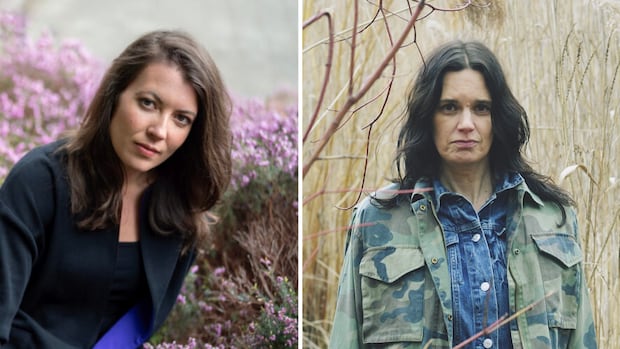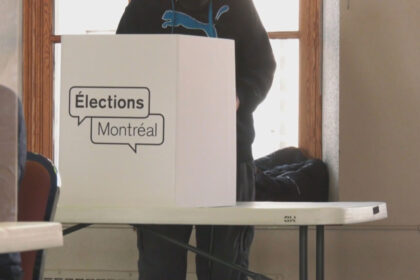Authors Maria Reva and Leanne Betasamosake Simpson were among the winners of the 2025 Writers’ Trust of Canada Awards, recognizing the country’s best writers and books of the year.Seven prizes were given out, totalling over $375,000, for fiction and non-fiction, plus mid-career and lifetime achievement awards. The winners were announced on Thursday at a ceremony in Toronto, hosted by Mattea Roach, of CBC Radio’s Bookends.Reva, Simpson take home top book prizesReva’s novel Endling won the $70,000 Atwood Gibson Writers’ Trust Prize for fiction, recognizing the best novel or short story collection by a Canadian author. ln Endling, Yeva, a scientist, is obsessed with breeding rare snails and lives on her own in a mobile lab, funding her work by dating Westerners who have come to Ukraine on romance tours, hoping to find brides untouched by feminism. Sisters Nastia and Solomiya are also entwined in the marriage industry, pretending to be a prospective bride and her translator to figure out what happened to their mother, a staunch activist against the industry who mysteriously disappeared. As Russia invades, their plans are foiled and the hard truths of war are examined, bringing in Ukraine-born Reva’s experiences grappling with the destruction in real life.”I had this kind of splitting of my reality of watching the war from abroad, hearing from our relatives, and then trying to somehow live this life here in Canada under peaceful skies,” said Reva on Bookends with Mattea Roach. “So I set the book aside and I kept obsessing over these questions. And then I decided I’m going to fold them into my novel and I’m going to draw back the curtain for the reader about what it’s like to try to write fiction in these times, at least what it was like for me.” The Atwood Gibson Prize for fiction jury — comprised of writers Gary Barwin, Ali Bryan and Jasmine Sealy — said that Endling’s brilliance “lies in Reva’s willingness to yank on the dangling thread of the unanswerable.””Among the many uncomfortable and incisive questions that [Maria] Reva asks in her brilliantly metafictional, propulsive, and topical novel set in contemporary Ukraine, is if it should exist at all,” wrote the jury in a statement.Reva is an author and opera librettist who was born in Ukraine and grew up in New Westminster, B.C., where she currently lives. Her short story collection Good Citizens Need Not Fear won the 2022 Kobzar Literary Award and was on the 2020 Writers’ Trust Fiction Prize shortlist. Endling is her debut novel and was also longlisted for the 2025 Booker Prize. “Endling just does not inspire consensus, and it’s not an easy book to love,” said Reva in her acceptance speech.”Endling asks how we can write fiction when its real-life setting, not just Ukraine, but the many stages of our shared world are burning. There is no consensus on how to reflect our reality in art, and there never will be. Maybe that’s the point.”The four remaining Atwood Gibson Prize finalists will each receive $7,500. They are Tim Bowling for Graveyard Shift at the Lemonade Stand, Robert McGill for Simple Creatures, Otoniya J. Okot Bitek for We, the Kindling and Aurora Stewart de Peña for Julius Julius. The books are available in accessible formats through the National Network for Equitable Library Services and the Centre for Equitable Library Access. Last year’s winner was Sheung-King for his novel Batshit Seven.Simpson’s book, Theory of Water, won the $75,000 Hilary Weston Writers’ Trust Award for non-fiction, the largest prize for non-fiction in Canada. “I’m very grateful to the Indigenous storytellers and writers who have come before me, the ones who told stories quietly and constantly to strengthen our hearts and minds and connections, who did not put their name on a book or seek to win a prize, but who aimed to build the world,” said Simpson in her acceptance speech.”I’m very grateful for the Indigenous women that came before me, that built the writing community that surrounds me. These are the ones that make me and my work possible.” In Theory of Water, Simpson traces the historical and cultural interactions of Indigenous peoples with water in all its forms. She presents water as a catalyst for radical transformation and shows how it has the potential to heal and reshape the world in response to environmental and social injustice. “We all have access to these bodies of water around us, in our urban centres, in our rural centres,” said Simpson on an episode of The Sunday Magazine.”I think spending time thinking about where that water goes, how it returns to us, is an important orienting force for us in terms of thinking through how we can protect water, and how we can make sure that all the forms of life on the planet have what they need to survive and to thrive.”Simpson is a Michi Saagiig Nishnaabeg scholar, activist, musician, artist, author and member of Alderville First Nation. Her books include Islands of Decolonial Love, This Accident of Being Lost, which was shortlisted for the Rogers Writer’s Trust Fiction Prize and the Trillium Book Award, Noopiming: The Cure for White Ladies, which was shortlisted for the Governor General’s Literary Award for fiction and the Dublin Literary Prize, and Rehearsals for Living, a collaboration with Robyn Maynard, which was shortlisted for the Governor General’s Literary Award for non-fiction.”In her radical exploration of water, Simpson topples anthropocentrism and conventional ontologies to reveal water in all its forms as a powerful decolonizing force that connects us all,” said jurors and Canadian authors Matthew R. Morris, Lorri Neilsen Glenn and Niigaan Sinclair. “Simpson’s brilliant and sintering weave of story, research, and Nishnaabeg teachings in Theory of Water offers a generous and transformative perspective on world-building.” The four remaining finalists will each receive $5,000. They are Omar El Akkad for One Day, Everyone Will Have Always Been Against This, Tessa McWatt for The Snag, Vinh Nguyen for The Migrant Rain Falls in Reverse by Vinh Nguyen and Miriam Toews for A Truce That Is Not Peace.Last year’s winner was Martha Baillie in for her memoir There is No Blue. The third book prize presented at the ceremony was the Dayne Ogilvie Prize for 2SLGBTQ+ emerging writers. Roza Nozari, a writer and illustrator based in Toronto, won the $12,000 prize for her debut memoir All The Parts We Exile.The book tells the story of Nozari’s search for belonging as a Canadian-born daughter of Iranian immigrants. It follows her experiences visiting Iran, learning the secrets behind why her family left, finding her queer identity, rejecting it, coming back to it and everything in between.“Maybe now just as much as ever, the courage for us as artists to say what needs to be said with the urgency in which we need to be to be sending it is incredibly important. And I’m so grateful to be here in the presence of so many other artists who have incredible courage to say what needs to be said right now,” said Nozari in her acceptance speech.Four authors win career awardsBren Simmers, left, won the Latner Griffin Writers’ Trust Poetry Prize and Sheree Fitch won the Matt Cohen Award. (Writers’ Trust of Canada)Bren Simmers received the Latner Griffin Award, $60,000 given to a mid-career poet in anticipation of their future contributions to Canadian poetry. Simmers, based in Prince Edward Island, is the author of five books. Her most recent is the poetry collection The Work, which explores the themes of loss and grief and how one can make themselves whole again after being broken. It recently won the Pat Lowther Memorial Award.Simmers also won the 2022 CBC Poetry Prize for her poem Spell World Backwards, which is included in The Work. “I’m so grateful to accept this award on behalf of all of the books I have read and responded to and that have shaped who I am as a person and a poet,” said Simmers in an acceptance speech.”Being a poet is the best way I have spent my time on this earth. It has taught me how to pay attention, to listen, to feel, to connect to the physical world and the living things I share it with.”Sheree Fitch won the $40,000 Matt Cohen Award, which celebrates a lifetime of distinguished work. Fitch, who lives on the East Coast of Canada, has written 19 books for children, including Toes in My Nose, four books for young adults and two poetry collections. She’s also known for her adult novel, Kiss the Joy As It Flies. Fitch, an officer of the Order of Canada, is an advocate for children’s literacy as the Honorary Patron of the Literary Coalition of New Brunswick and the Honorary Spokesperson for the Nova Scotia Read to Me program.”I am a storyteller: I am so grateful that many of the stories and poems I have written have ended up in books and in homes and in schools and in libraries and around the world, from Bhutan to Nunavut to China to Africa and in childcare centres and in the hearts of so many,” said Fitch in her acceptance speech.“It has been such a privilege and a blessing to have been a storyteller.”Kim Thúy, left, won the Writers’ Trust Engel Findley Award and Julie Flett won the Vicky Metcalf Award for Literature for Young People. (Writers’ Trust of Canada)Julie Flett won the Vicky Metcalf Award for Literature for Young People, a $40,000 prize, in recognition of her lifetime achievement in children’s literature. Flett is a Cree-Métis author and illustrator. She has won two Governor General’s Awards, the American Indian Library Association Award and the TD Canadian Children’s Literature Award. Her books include We All Play and Let’s Go. Kim Thúy took home the $25,000 Writers’ Trust Engel Findley Award, which recognizes the accomplishments of a predominantly fiction writer in the middle of their career. Born in Saigon, Thúy left Vietnam at 10 years old and settled with her family in Quebec. Her novels include Em, Vi, Man and Ru. Ru won the Governor General’s Literary Award for French-language fiction and the English translation was a finalist for the Scotiabank Giller Prize in 2002. It also won Canada Reads 2015, when it was championed by film critic Cameron Bailey, and was made into a feature film. “I’ve had the opportunity to meet a lot of writers, a lot of readers, and there’s one question which I have never been asked. And the question is, why do we read?” said Thúy in her acceptance speech. “I probably would tell them that what I experience is that when a government wants to have a harder control on a population, the first thing they would do is to ban books. So we don’t know the impact, but somehow we become very important when we want people to stop thinking. “So I thought maybe [it’s] because literature transforms history into experience and literature and humanizes history.”
B.C.’s Maria Reva wins $70K Atwood Gibson Writers’ Trust Prize for fiction










